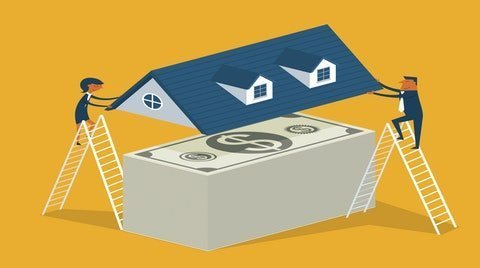在加拿大,卖家房产经纪在房源登上MLS系统之后,一般都会在周六日2-4点举办Open House (公众开放日),方便买家来看房。公众开放日期间,买家可以不用预约,直接walk-in 去看房。看房过程中,买家一般会比较关注屋子内的陈列,摆设,格局,采光等,但对于一些细节,比如墙面,地板,天花板,窗户等,一般不太在意。而一个有经验的房产经纪,在陪同买家看房过程中,就会关注一些比较细节,但是对于房子本身价值非常重要的东西,比如屋顶,锅炉,热水炉的保养情况,屋子内漏水的痕迹,虫害的痕迹,室内的气味,室内装修的finish, 用料,窗外的view, 房子周边是否有大树,高压线等。所以建议买家在做出买房决定后,尽快寻找一位在专业程度,时间安排,性格脾气和买家自己匹配的房产经纪,这样买房的过程会更加省心,高效。
6 Things Your REALTOR® is Looking For At An Open House
Article written By Wendy Helfenbaum
When visiting a property for sale, buyers usually notice things like how updated the finishings are, the natural lighting, and the number of bedrooms and bathrooms. You’re so excited about the space, it can be easy to miss the small but important details, like how there are no outlets in the bathroom and the living floor slopes towards one side. This is why it’s crucial to work with an experienced REALTOR® who can help provide a critical eye.
While your REALTOR® doesn’t replace a home inspector, they can help flag things. Here’s what they’re looking out for on your behalf.

Odd smells, sounds, or sensations
REALTORS® use all their senses while walking through a property, and they’re attuned to things buyers may not notice.
“I’m not a home inspector; I’m another set of eyes, ears, nose and even touch,” explains Glenda Caplan, a REALTOR® and commercial and residential salesperson at The Agency in Montreal, Quebec.
“For example, there’s a basement smell and then there’s humidity and mould. If, when walking towards the furnace room, you’re smelling oil or mould, that may be a problem. In my head, I’m calculating: they need to change the furnace, or potentially install French drains if there’s water infiltration.”
REALTORS® also listen for excessive noise—from a nearby airport or school—that could impact how buyers will enjoy a property.
Did you know? Strong odours can be one of the main reasons your home isn’t selling. Find six other common reasons your home may not be selling.

Abnormalities on ceilings, walls, or floors
Multiple or diagonal cracks on ceilings, walls, or floors could indicate something needs to be investigated further during the home inspection, warns Caplan. Ditto for any mould around windows.
“Sometimes, you see different kinds of ceiling paint, which might mean potential water damage. And if one wall looks very freshly painted, what happened in that room?” she adds. “Walking without shoes on, I’m also feeling the floors. Are they mushy or lopsided? Are the floorboards moving as you’re moving?”
Your REALTOR® may also highlight whether there are enough electrical outlets in key areas—especially in the kitchen.

Poorly done renovations
Buyers may be impressed by shiny new kitchens and bathrooms or a new roof, but your REALTOR®’s trained eye checks for workmanship and quality.
“If the roof was replaced three years ago and you can already see the shingles curling, maybe the job or the shingles weren’t the greatest,” says Caplan, adding sloppy patch jobs inside the house could mean the owners skimped on maintenance and repairs.
In addition to being an eyesore, poorly done renovations could also mean big repair bills down the line. This is another reason you should never skip a home inspection. While your REALTOR® can point to areas they think are concerning, a home inspection can uncover major issues you’ll want to know about before putting in an offer.

A choppy floor plan
Buyers who watch home renovation shows often think they can knock down any wall to create the perfect layout. REALTORS® help bring a different perspective, pointing out where the load-bearing walls are likely to be—which require added structural support if removed to create an open concept.
“I’m not a licensed inspector, an architect, or a structural engineer, but as a REALTOR® who’s been through inspections with my clients, we can spot things that are potentially problematic,” explains Caplan.
“If the basement is unfinished or semi-finished, you can see where the beams are and where the structural walls are. With money, anything can be done, but buyers would need to speak to a structural engineer because in some properties, it’s not worth making an open concept.”

Rooms with a (terrible) view
Most people wouldn’t want their bedroom window looking directly into their neighbours’, but buyers don’t always check the views the way REALTORS® do, notes Caplan.
“Your neighbors and surrounding environment are very important. If your yard backs onto an apartment building, people on the higher floors will be looking down on you,” she says.
Your REALTOR® will also know if there are buildings going up or other potential plans in the area that may impact your view.

Problematic trees
Older neighbourhoods are blessed with many beautiful shade trees, but if the ones on or near your property are diseased or too big, your REALTOR® may flag that, says Caplan.
“The rule of thumb is that roots are as wide as the tree is high, so a 40-foot-high tree will have 40-foot-long roots. Are they growing towards your house or the sewage drains? Will they crack your foundation by pushing too much against it? These things can affect the inside of the house,” she explains.
“When I see a huge tree, I suggest buyers get a drain scope when they do their inspection to make sure the roots haven’t affected the pipes, because that could be a very expensive problem.”

Your trusted advisor
“I want buyers to experience the house and imagine living there. I’m there as a backup to protect them and somewhat ground them,” notes Caplan. “Even if it’s not perfect and not renovated, if the space works for them, we can always do renovations. But if they also need foundation work and a roof, it can get quite costly.”
Having professional guidance and support of a REALTOR® while walking through a property provides a valuable perspective to help you make the best decision for your needs.

















